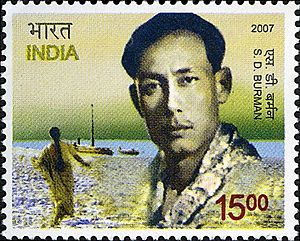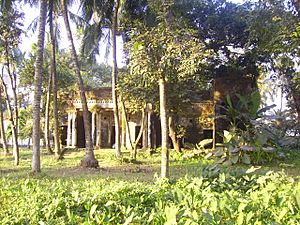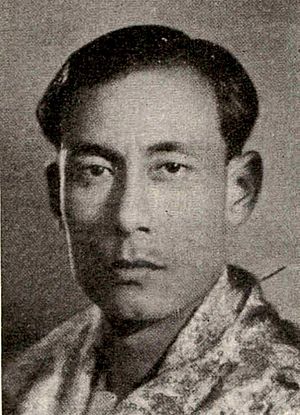S. D. Burman facts for kids
Quick facts for kids
S. D. Burman
|
|
|---|---|

Burman on a 2007 stamp of India, commemorating his 101st birth anniversary
|
|
| Background information | |
| Birth name | Sachin Dev Burman |
| Born | 1 October 1906 Cumilla, Bengal Presidency, British India, (present-day Bangladesh) |
| Died | 31 October 1975 (aged 69) Bombay, Maharashtra, India (present-day Mumbai) |
| Genres |
|
| Occupation(s) |
|
| Instruments | |
| Years active | 1932–1975 |
Sachin Dev Burman (born October 1, 1906 – died October 31, 1975) was a famous Indian music director and singer. He was a member of the Tripura royal family. He began his music journey with Bengali films in 1937.
Later, he started composing for Hindi movies. He became one of India's most successful film music composers. Burman created music for over 100 movies, including both Bengali and Hindi films. He was a very talented composer and also sang songs. His singing style was a mix of semi-classical and folk music from Bengal. His son, R. D. Burman, also became a well-known music composer in Bollywood.
Many top singers of his time sang Burman's compositions. These included Kishore Kumar, Lata Mangeshkar, Mohammed Rafi, Geeta Dutt, Manna Dey, Hemant Kumar, Asha Bhosle, Shamshad Begum, Mukesh, and Talat Mahmood. As a singer for films, Burman sang 14 Hindi and 13 Bengali songs himself.
Contents
Early Life and Family Background
Sachin Dev Burman was born on October 1, 1906, in Comilla. This area was part of Bengal Presidency then, and is now in Bangladesh. His mother was Rajkumari Nirmala Devi, a princess from Manipur. His father was Rajkumar Nabadwipchandra Dev Burman from Tripura. His grandfather was Maharaja Ishan Chandra Manikya Dev Burman, the ruler of Tripura.
Sachin was the youngest of his parents' five sons. They had nine children in total. Sadly, his mother passed away when he was only two years old.
His Education and Music Training
S. D. Burman first went to Kumar Boarding school in Agartala, Tripura. This school was for children of royal and very rich families. His father noticed that the teachers were not focusing enough on teaching. So, he moved Sachin to Yusuf School in Comilla. Later, Sachin joined Comilla Zilla School.
He finished his high school (Matriculation) in 1920 when he was 14. He then went to Victoria College in Comilla. He completed his IA in 1922 and his BA in 1924. Burman then moved to Kolkata to study for a Master's degree at Calcutta University. However, he did not finish it because his love for music took over.
He started his official music training from 1925 to 1930 under the musician K. C. Dey. In 1932, he learned from Bhishmadev Chattopadhyay. He also trained with Khalifa Badal Khan, a sarangi expert, and Ustad Allauddin Khan, a sarod player. He even brought his teachers K.C. Dey, Khalifa Badal Khan, and Allauddin Khan to Agartala. The famous Bengali poet, Kazi Nazrul Islam, also spent time at their family home in Comilla in the early 1920s.
Starting His Music Career in the 1930s
Burman began his career as a radio singer at Calcutta Radio Station in the late 1920s. At first, he focused on Bengali folk music and light Hindustani classical music. His songs were greatly inspired by the folk tunes from present-day Bangladesh and other parts of India.
His first music record came out in 1932. It featured a semi-classical song and a folk song. In the next ten years, he became a very popular singer. He recorded 131 songs in Bengali. He also sang for other composers like Himangsu Dutta and Kazi Nazrul Islam.
In 1934, he was invited to the All India Music Conference. He performed his Bengali Thumri for important people like Vijaya Lakshmi Pandit. Later that year, he sang at the Bengal Music Conference in Kolkata. Rabindranath Tagore opened this event. Burman won a Gold Medal there for his Thumri.
He built a house in Kolkata. On February 10, 1938, he married his student, Meera Das Gupta. Some say his royal family was upset because she was not royal. However, others say he left his royal ties because he was unhappy with how his family was treated. He chose to focus on his music career rather than his royal background. Their only child, Rahul Dev Burman, was born in 1939. Both Meera and Rahul later helped S. D. Burman with his music.
Burman also acted and sang in a few films. His first film as a singer was Sanjher Pidim (1935). As a music composer, he started with Bengali plays. His first film score was for Rajgee (1937). His second film, Rajkumarer Nirbashan (1940), became a big hit. He composed music for over 20 Bengali films and 89 Hindi films in total.
Success in the 1940s and 1950s
In 1944, Burman moved to Mumbai. He was asked by Sasadhar Mukherjee of Filmistan to compose music for two films. His big break came in 1947 with the film Do Bhai. The song Mera Sundar Sapna Beet Gaya, sung by Geeta Dutt, was a huge hit. In 1949, Shabnam became his biggest success with Filmistan. Its song Yeh Duniya Roop ki Chor was very popular.
In the 1950s, Burman worked with Dev Anand's Navketan Films. They created many musical hits like Taxi Driver (1954) and Kala Pani (1958). He also composed for Munimji (1955) and Paying Guest (1957). Songs sung by Kishore Kumar and Mohammed Rafi for these films became very famous.
His music for Baazi (1951) was very successful. This film's jazzy music showed a new side of singer Geeta Dutt. The song "Yeh Raat Yeh Chandni" from Jaal (1952) is still a classic. "Thandi Hawain" from Naujawan (1951) was one of his first major hits with Lata Mangeshkar.
He also composed music for Guru Dutt's famous films Pyaasa (1957) and Kaagaz Ke Phool (1959). The music of Pyaasa was even chosen as one of "The Best Music in Film" by a British film magazine in 2004.
In 1957, S. D. Burman had a disagreement with Lata Mangeshkar. He then started working mostly with her younger sister, Asha Bhosle, as his main female singer. The team of S. D. Burman, Kishore Kumar, Asha Bhosle, and lyricist Majrooh Sultanpuri became very popular. Asha Bhosle later married his son, R. D. Burman.
In 1958, S. D. Burman composed music for Kishore Kumar's film Chalti Ka Naam Gaadi. That same year, he won the Sangeet Natak Akademi Award. He is the only music director to have won this important award. Burman often found inspiration in folk music, classical music, and even everyday sounds. For example, he used a Muslim Muezzin's call for prayers to create a tune for a song in Kala Pani.
Later Career in the 1960s and 1970s
In the 1960s, Burman often used his unique voice in films. His thin but strong voice was used for special songs that felt like a story being told. Examples include "O Re Majhi Mere Sajan Hai Us Paar" from Bandini (1963) and "Wahan Kaun Hai Tera" from Guide (1965). For "Saphal Hogi Teri Aradhana" from Aradhana, he won the National Film Award for Best Male Playback Singer in 1970.
He had some health issues in the early 1960s, but he still created many hit films later in the decade. In 1961, Burman and Lata Mangeshkar started working together again.
His partnership with Dev Anand and Navketan Films continued to produce hits like Bombai Ka Babu (1960) and Jewel Thief (1967). In 1963, he composed for Meri Surat Teri Aankhen. In this film, Manna Dey sang "Poocho Na Kaise Maine," a song based on a classical raga.
Other popular films from this time were Bandini (1963) and Teen Devian (1965). Guide (1965) was one of his best works, with all its songs becoming super-hits.
Aradhana (1969) is another very important film in Bollywood music history. Its music helped launch the careers of singer Kishore Kumar, lyricist Anand Bakshi, and filmmaker Shakti Samanta. Originally, another singer was supposed to sing all the songs. But because he was away, Burman suggested using Kishore Kumar. All the songs became huge hits, making Kishore Kumar famous overnight.
In the 1970s, Burman continued to create classics. Some of these include Tere Mere Sapne (1971), Sharmeelee (1971), Abhimaan (1973), and Mili (1975).
Personal Life
S. D. Burman married Meera Dasgupta, a Bengali film lyricist and musician, on February 10, 1938. They had one son, the famous music composer R. D. Burman, who was born on June 27, 1939.
His Relationship with Kishore Kumar
Burman was one of the few composers who used both Kishore Kumar and Mohammed Rafi almost equally. He thought of Kishore as his second son. Kishore Kumar himself said that Sachin Da gave him his first big chance. Even when Sachin had a stroke while rehearsing a song for the film Mili, Kishore visited him in the hospital. He told him not to worry, promising the recording would go well. That song, "Badi Sooni Sooni Hai," is now one of Kishore Kumar's best. Sachin also used to call Kishore late at night to sing new tunes he had composed and ask Kishore to sing along.
His Passing
S. D. Burman went into a coma shortly after rehearsing the song "Badi Sooni Sooni Hai" for the film Mili. After being in a coma for some days, he passed away on October 31, 1975, in Mumbai.
His Lasting Legacy
S. D. Burman's music continues to inspire people. British singer Najma Akhtar recorded an album of his songs called Forbidden Kiss: The Music of S.D. Burman.
The famous Indian cricketer Sachin Tendulkar was named after S. D. Burman. Sachin's father was a big fan of the composer.
The singer and mimicry artist Sudesh Bhonsle often imitates S. D. Burman's unique singing style.
Burman had a special way of composing film songs. While most composers used a harmonium or piano, he often created tunes using rhythms like clapping hands. He was very fond of "Paan" (a traditional Indian chew).
His first biography in English, "Incomparable Sachin Dev Burman," was written by HQ Chowdhury.
On October 1, 2007, to mark his 101st birthday, the Indian Postal Service released a special postage stamp in his memory. The state government of Tripura also gives out a yearly "Sachin Dev Burman Memorial Award" for music.
A music college, Sachin Dev Barman Memorial Government Music College, was built in Agartala, Tripura, in his honor.
Filmography
- Sudurer Priye (1935)
- Rajgee (1937)
- Jakher Dhan (1939)
- Amar Geeti (1940)
- Nari (1940)
- Rajkumarer Nirbashan (1940)
- Pratishodh (1941)
- Ashok (1942)
- Avayer Biye (1942)
- Jibon Sangini (1942)
- Mahakavi Kalidas (1942)
- Milan (1942)
- Jajsaheber Nathni (1943)
- Chhadmabeshi (1944)
- Maatir Ghar (1944)
- Pratikar (1944)
- Kalankini (1945)
- Matrihara (1946)
- Eight Days (1946)
- Shikari (1946)
- Dil Ki Rani (1947)
- Do Bhai (1947)
- Chittor Vijay (1947)
- Vidya (1948)
- Shabnam (1949)
- Kamal (1949)
- Mashaal / Samar (In Bengali) (1950)
- Afsar (1950) (Navketan's first production)
- Pyar (1950)
- Buzdil (1951)
- Sazaa (1951)
- Naujawan (1951)
- Baazi (1951)
- Bahar (1951)
- Ek Nazar (1951)
- Jaal (1952)
- Lal Kunwar (1952)
- Armaan (1953)
- Shahenshah (1953)
- Babla (1953)
- Jeevan Jyoti (1953)
- Taxi Driver (1954)
- Angarey (1954)
- Radha Krishna (1954)
- Chalis Baba Ek Chor (1954)
- Devdas (1955)
- Munimji (1955)
- House No. 44 (1955)
- Society (1955)
- Mad Bhare Nain (1955)
- Funtoosh (1956)
- Paying Guest (1957)
- Pyaasa (1957)
- Nau Do Gyarah (1957)
- Miss India (1957)
- Solva Saal (1958)
- Lajwanti (1958)
- Chalti Ka Naam Gaadi (1958)
- Kala Pani (1958)
- Sitaron Se Aage (1958)
- Sujata (1959)
- Kaagaz Ke Phool (1959)
- Insaan Jaag Utha (1959)
- Manzil (1960)
- Kala Bazar (1960)
- Bombai Ka Babu (1960)
- Miyan Biwi Razi (1960)
- Apna haath jagannath (1960)
- Bewaqoof (1960)
- Ek Ke Baad Ek (1960)
- Baat Ek Raat Ki (1962)
- Dr. Vidya (1962)
- Naughty Boy (1962)
- Bandini (1963)
- Meri Surat Teri Ankhen (1963)
- Tere Ghar Ke Samne (1963)
- Ziddi (1964)
- Kaise Kahoon (1964)
- Benazir (1964)
- Teen Devian (1965)
- Guide (1965)
- Jewel Thief (1967)
- Talash (1969)
- Aradhana (1969)
- Jyoti (1969)
- Prem Pujari (1970)
- Ishq Par Zor Nahin (1970)
- Gambler (1971)
- Naya Zamana (1971)
- Sharmilee (1971)
- Chaitali (1971)
- Tere Mere Sapne (1971)
- Yeh Gulistan Hamara (1972)
- Zindagi Zindagi (1972)
- Anuraag (1972)
- Abhimaan (1973)
- Jugnu (1973)
- Chhupa Rustam (1973)
- Phagun (1973)
- Us Paar (1974)
- Prem Nagar (1974)
- Sagina (1974)
- Chupke Chupke (1975)
- Mili (1975)
- Barood (1976)
- Arjun Pandit (1976)
- Deewaangee (1976) only one song, remaining songs were composed by Ravindra Jain
- Tyaag (1977)
Awards and Recognitions
- 1934: Gold Medal, Bengal All India Music Conference, Calcutta
- 1958: Sangeet Natak Akademi Award
- 1959: Asia Film Society Award
- 1964: Sant Haridas Award
- National Film Awards
- 1970: National Film Award for Best Male Playback Singer: For the song Safal Hogi Teri Aradhana from Aradhana
- 1974: National Film Award for Best Music Direction: For the film Zindagi Zindagi
- 1969: Padma Shri (a high civilian award in India)
- 2007: A special postage stamp (worth Rs 15) was released in his memory.
- Filmfare Awards
- 1954: Filmfare Best Music Director Award: For Taxi Driver
- 1973: Filmfare Best Music Director Award: For Abhimaan
- BFJA Awards (Bengal Film Journalists' Association Awards)
- 1965: Best Music (Hindi Section): For Teen Devian
- 1966: Best Music (Hindi Section): For Guide
- 1966: Best Male Playback Singer (Hindi Section): For Guide
- 1969: Best Music (Hindi Section): For Aradhana
- 1973: Best Music (Hindi Section): For Abhimaan
See also
 In Spanish: Sachin Dev Burman para niños
In Spanish: Sachin Dev Burman para niños
 | Selma Burke |
 | Pauline Powell Burns |
 | Frederick J. Brown |
 | Robert Blackburn |



